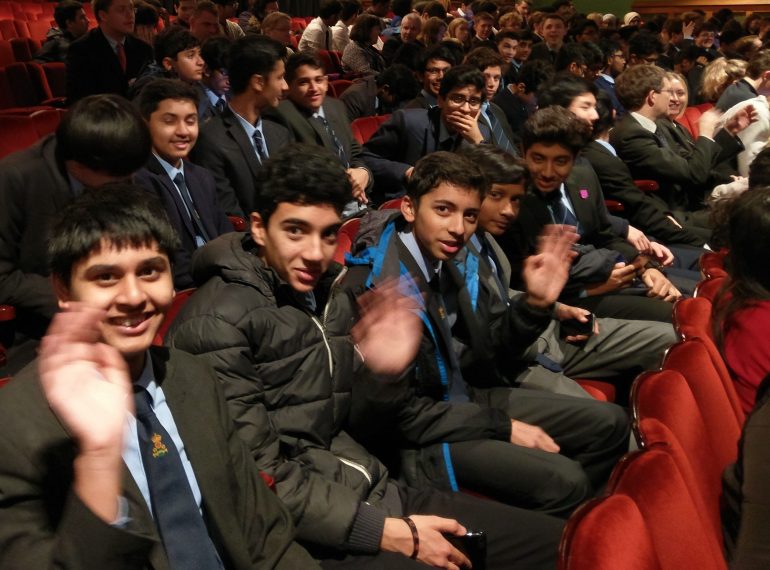
Sixty-two boys from Year 11 headed off to the West End to hear from some of the country’s most engaging Mathematics speakers – including one who hit the headlines with her investigation into Ryanair’s seat allocation policy.
The Maths Inspiration Show at the Piccadilly Theatre featured interactive lectures on a wide range of mathematical topics. It was hosted by Matt Parker, who has the unique distinction of holding the prestigious title of London Mathematical Society Popular Lecturer and of having a sold-out comedy show at the Edinburgh Festival Fringe.
Afterwards, the boys were full of praise for the event. Viraj Mehta said: “I found the lectures intellectually stimulating whilst still being humorous and interactive. I especially enjoyed the variety of topics of maths and how they link to everyday life.” For his part, Joshua Han said the show was “much more interesting and entertaining than I expected.”
 Among the speakers were Jennifer Rogers, who gained a PhD at Warwick and is now a research fellow in the Department of Statistics at the University of Oxford. She was widely quoted this summer when she worked with the BBC’s Watchdog programme on investigating Ryanair’s claims that it allocated seats to people who had not paid to reserve seat on an entirely random basis. All the people in her sample were allocated the dreaded middle seats – and the chances of that happening were smaller than the chance of winning the National Lottery jackpot, she found. In her lecture, she explained how she had made the calculations using simple probability and asked the audience to consider whether this meant Ryanair’s claim to random allocation was invalid.
Among the speakers were Jennifer Rogers, who gained a PhD at Warwick and is now a research fellow in the Department of Statistics at the University of Oxford. She was widely quoted this summer when she worked with the BBC’s Watchdog programme on investigating Ryanair’s claims that it allocated seats to people who had not paid to reserve seat on an entirely random basis. All the people in her sample were allocated the dreaded middle seats – and the chances of that happening were smaller than the chance of winning the National Lottery jackpot, she found. In her lecture, she explained how she had made the calculations using simple probability and asked the audience to consider whether this meant Ryanair’s claim to random allocation was invalid.
 Mathematician and juggler Colin Wright received his maths doctorate in 1990 from Cambridge University. He looked at the importance of spotting patterns – showing that juggling tricks are, in fact, patterns with mathematical properties – but warned that patterns are not always as predictable as they seem.
Mathematician and juggler Colin Wright received his maths doctorate in 1990 from Cambridge University. He looked at the importance of spotting patterns – showing that juggling tricks are, in fact, patterns with mathematical properties – but warned that patterns are not always as predictable as they seem.
Comedian and science communicator Steve Mould showed the audience his favourite shape, the Reuleaux triangle – a shape formed from the intersection of three discs. He also gave his name to the Mould Effect: his clip of a 50-meter string of metal balls briefly and mysteriously flowing upwards before plunging to the ground caused a Youtube sensation in 2013.
